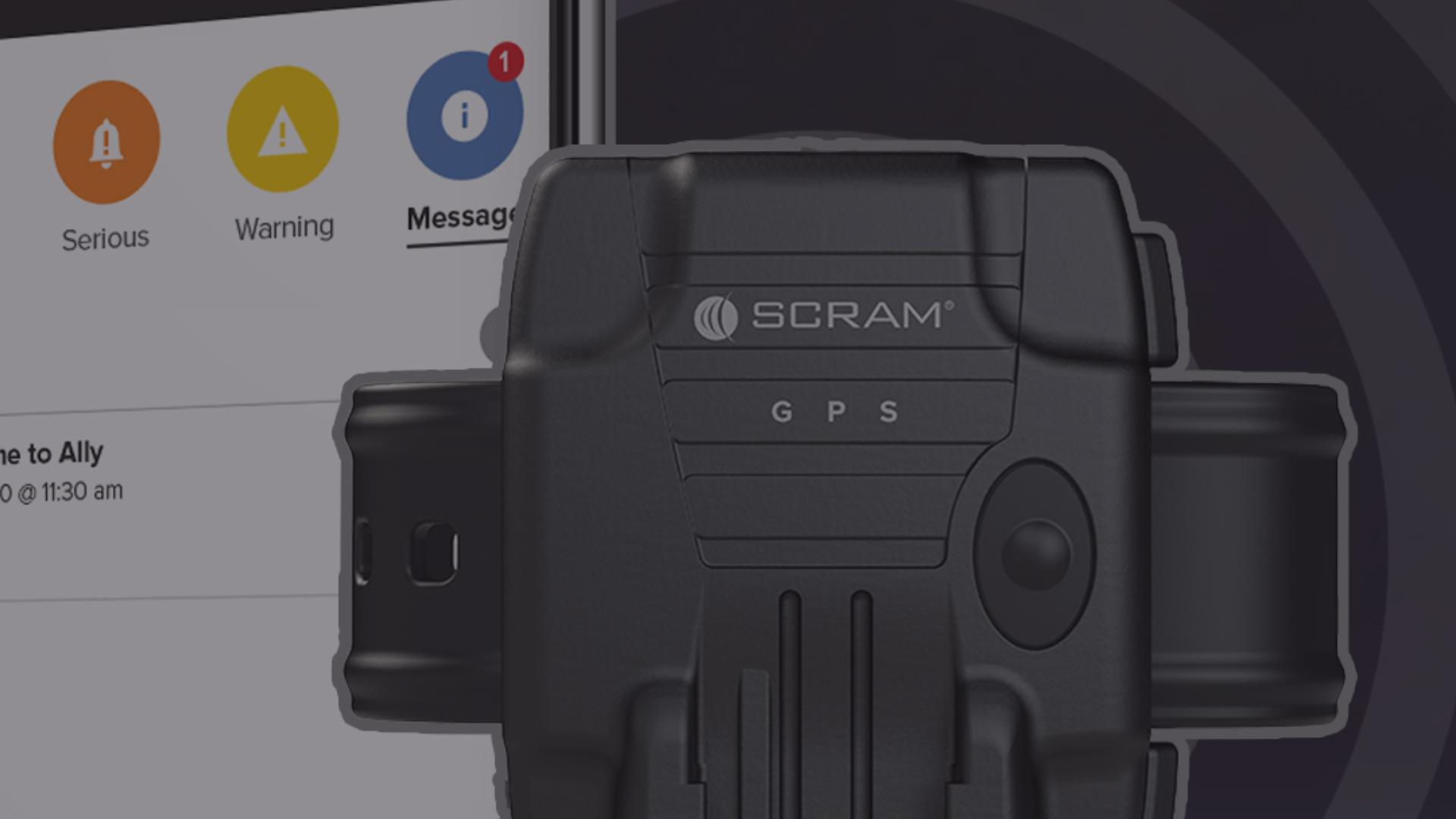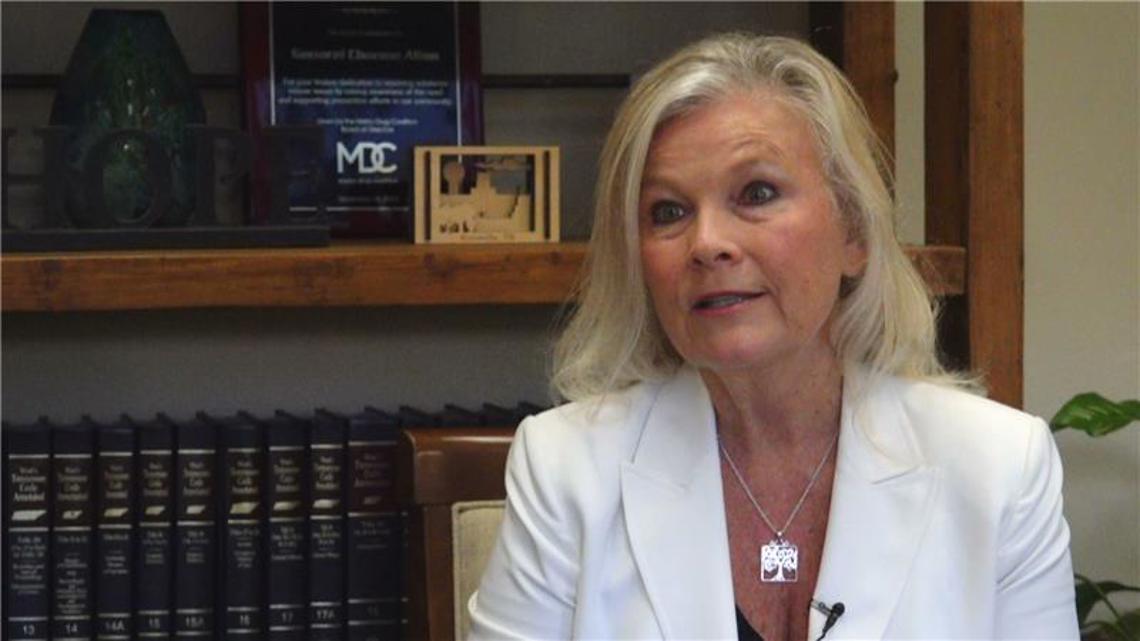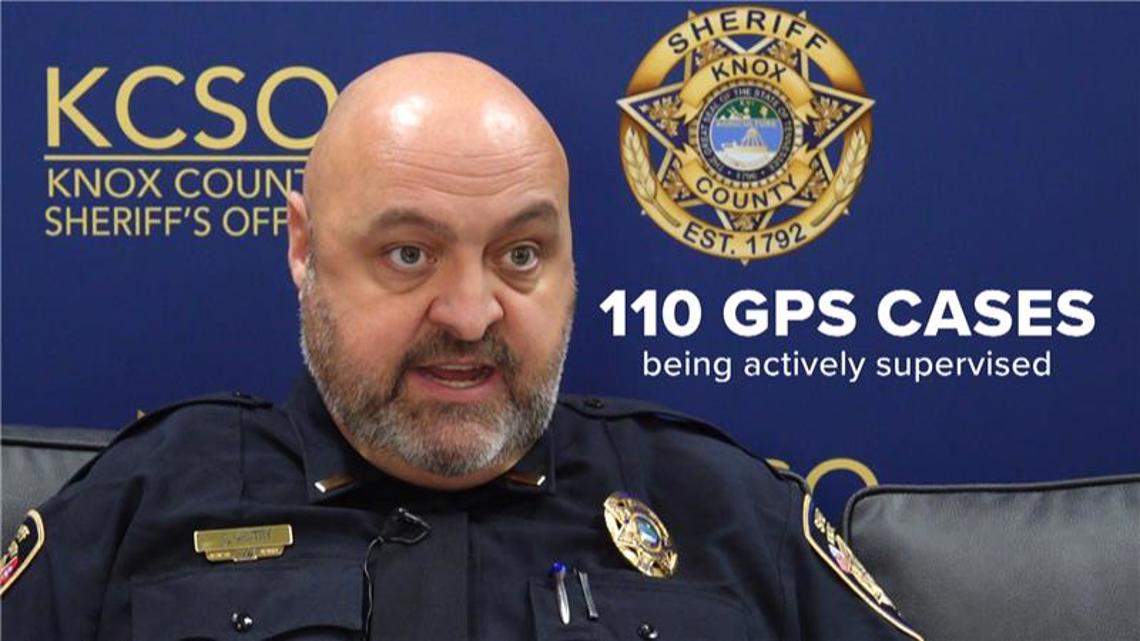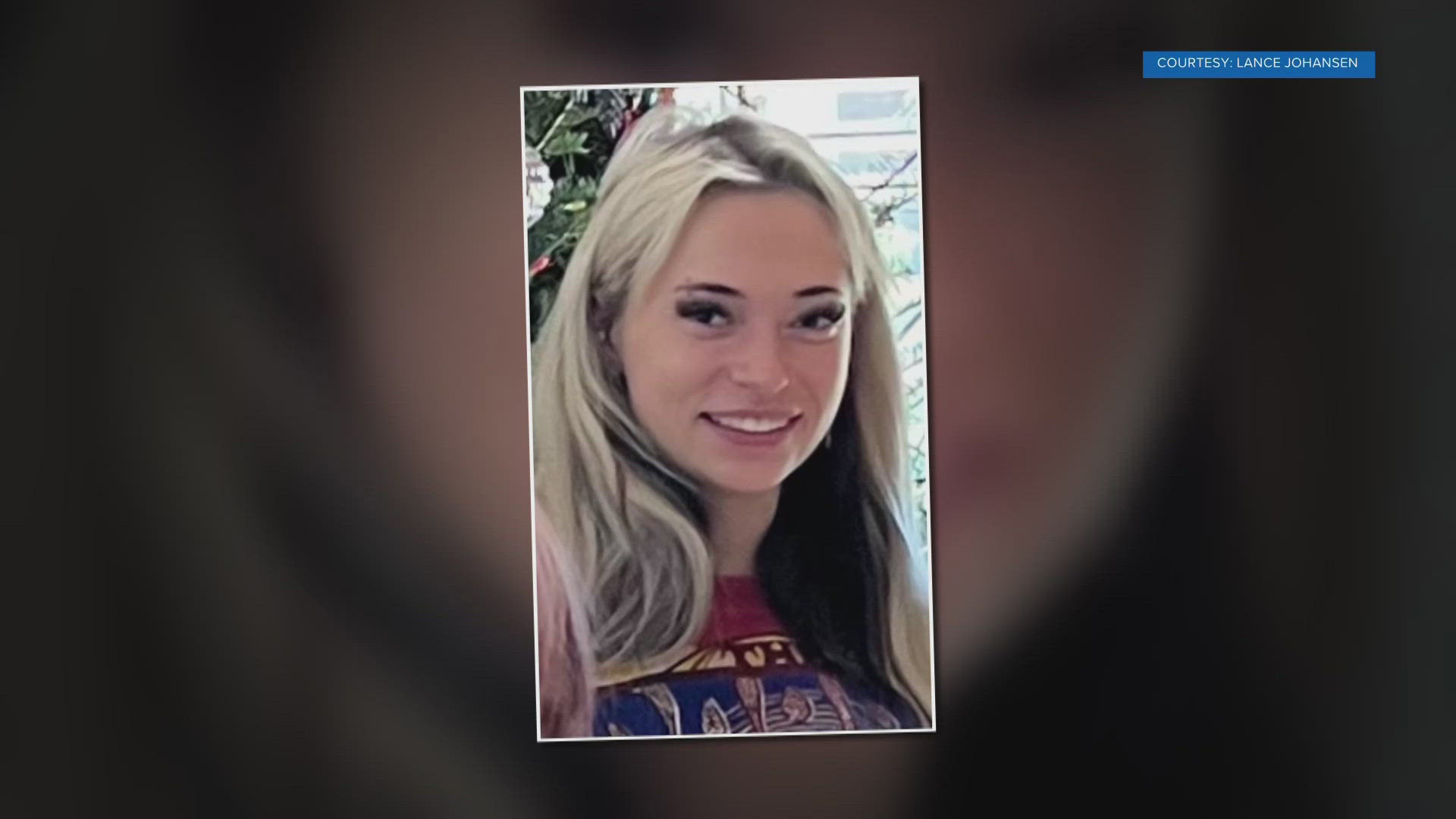'It would have at least given them a fighting chance' | How Tennessee enforces GPS ankle monitoring
It's been four months since legislation was enacted to require new GPS monitoring for violent offenders. Local leaders and victims share how that process is going.
WBIR

Four months ago, new legislation was enacted in Tennessee requiring courts to order violent offenders to wear GPS monitoring devices that can notify a victim if the offender is near them.
In 2022, 62,217 domestic violence victims were reported to the Tennessee Incident-Based Reporting System. This legislation aims to lower that number.
Since that law took effect, local departments have struggled to keep up, with some saying there's still a way to go.
Lauren Johansen
Lance Johansen's daughter Lauren was murdered in July. Johansen said she was sweet, loving and giving, an animal lover with plans to graduate nursing school
"My daughter was just a wonderful person," Johansen said. "It just breaks my heart that I've lost her. And that something so simple as even one phone call from a number of different people could have saved her life. Nobody did anything."


At 22 years old, Lauren was killed by her ex-boyfriend who was just months previously charged with severely beating her in Nashville, according to Lauren's father.
"When the police came, you know, he was trying to kill her," he said. "He had beaten her face in so badly that she couldn't see out of her left eye and she was screaming for her life when the police opened the door and let her out."
Bricen Rivers, 23, faced several charges including especially aggravated kidnapping, stalking and interfering with a 911 call. Johansen said Rivers was fitted with an ankle monitor.
"I received this call out of the blue from the victim's advocate woman with the district attorney's office saying that they've let him out," Johansen said. "They don't know where he is and they can't get in touch with him. Nobody could tell me where he was on his GPS monitor. And I kept calling people. The DA'S office didn't know, the victim advocate didn't know. I called the bond office and they didn't know and they finally got ahold of the ankle monitoring person."
Shortly after, Lauren was killed in Mississippi, following a manhunt for Rivers.
"In this particular case, what the ankle monitor did was help document the murder of my daughter," he said. "That's the only purpose that it served was to document how the murder happened, where he was and where he went with her body."
Marie Varsos and Debbie Sisco
That information was something Alex Youn said his mother and sister didn't have leading up to their murders in 2021.
"While it saddens me that there are still cracks there, it still leaves us room to improve and continue to sort of fight, you know, for that and give victims information that they need to protect themselves," Youn said.


Youn said his sister Marie Varsos was assaulted by her husband while in the middle of a separation.
"Was he arrested? Yes. Was he detained? Yes. Was it for the required time? No. He was illegally released and he did not have GPS monitoring on him and he had a follow-up court date," he said.
Before that court date, he said Sean Varsos parked in front of Marie's house before killing her and her mother, Debbie Sisco.
"I think that had this law been in effect, they would have known that he was sitting out front," Youn said. "Law enforcement would have known and my sister would have known during this sort of stage."
That tragedy pushed Youn to fight for legislation.
"I don't want other families to experience what our family experienced," he said. "It's very painful, it hurts, and my hope is that, you know, amongst this tragedy, that at least their story is able to protect others and to shine light on what shouldn't happen and how we can better protect victims of domestic violence."
In July, the Debbie and Marie Domestic Violence Protection Act was enacted. It requires violent offenders to wear a GPS monitoring device during their pre-trial period as a condition of bail.
"If the Debbie and Marie Domestic Violence Protection Acts were enacted at the time of their death, then it would have at least given them a fighting chance," Youn said.
Knoxville officials take on GPS monitoring
Knox County Attorney General Charme Allen
Knox County Attorney General Charme Allen said her office prosecutes many domestic violence cases.
"I think this is a really good law that has gone into effect because it has given us yet another tool to protect domestic violence victims," Allen said. "The last statistics I saw were that law enforcement in Knox County responds to a domestic violence call every 20 minutes. So three an hour."
And while those offenders are awaiting trial, she said its important to make sure they are protected. Allen explained GPS monitoring is not new.
"But we, because of this law, have now changed the way that we do GPS monitoring," she said.


There are two different ways to set it up.
First, Allen said you can create exclusion zones, like a victim's home, school or work, that a defendant cannot visit.


She also said there is a proximity zone that shows where a victim is in real time through an app.


"Now we have that option where we can give that phone app to the victim," Allen explained. "So she has more protection with her at all times, 24/7."
While the Knox County attorney general said it's helpful for victims, she said this change has created more work.
"It is a heavy lift," she said. "It's a lot of work. It's a lot of monitoring and I know that pre-trial is really struggling to keep up."
Knox County Director of Pre-Trial Release Stoney Gentry
Knox County Director of Pre-Trial Release Stoney Gentry said one of those biggest changes has come from this new legislation.
"Pretrial release is set up as an alternative to cash bonds. It's been around since the seventies, but it's changed dramatically through the years," Gentry said. "It requires many more individuals that are arrested for domestic violence, if court sees fit, to be, not only fitted themselves with a GPS device, but also have a device available to the victim of that case."
In 2023 between July 1 and Oct. 15, there were 61 GPS referrals, according to Gentry. This year in that same time period, there have been 262 referrals, which is a 329% increase.
"Eighty percent of those are from the Debbie and Marie Domestic Violence Act," he said.


All of those are monitored by people in Gentry's department.
"We place the devices on, we monitor the devices when alerts are received," Gentry said. "My officers respond to those alerts, and if necessary, we also send dispatch out in addition. Right now, we currently have 110 GPS cases that are being actively supervised, which is the most we've ever had at one point in time."
While the workload has increased dramatically, he said the funding has not. Gentry said his department and the local jail are overwhelmed.
"This was an unfunded mandate that has created a lot of issues and damage," he said.
Knoxville Defense Attorney Nate Ogle
Nate Ogle is a Knoxville defense attorney who has seen the legislation's impact including on the clients he represents.
"There is a lack of consistency," Ogle said. "There seems to be differing prices associated with these GPS monitors in different jurisdictions, different ways in which these programs are being administered.
Oftentimes what I have seen is there are situations that have arisen where local jails or pretrial monitoring groups are having a hard time getting these monitors for one and then two, they're having a hard time making contact with alleged victims in these cases because the statute requires that they make contact with them and get them enrolled into these programs."
Ogle said that means his clients are sitting in jail waiting to be fitted with a monitor.
"Sadly, it's not working within the time frame that's allotted under the statute," he said. "I have seen situations where individual citizens accused - who are presumed innocent - are being held well past the statutory time that's allotted. Sometimes well over a day."


A situation he said is concerning.
"Now, instead of it being a tool or a part of pretrial monitoring that could be enlisted under certain facts and circumstances that might be applicable to a certain person, it's this one size fits all approach where we're using this in any and all situations where you have domestic assault, domestic aggravated assault that's been alleged," Ogle said. "Nothing's been proven at this point."
Ogle says the cost of the devices is also a concern for his clients.
"In these sorts of circumstances where clients of ours are being required to put on these GPS monitoring devices, oftentimes what we're seeing is immense, really high cost associated with these monitoring devices, especially here in Knox County and other surrounding counties," Ogle said, citing on client who says he's paying nearly $460 a month for the device. "What we know about persons that are charged with domestic violence and facing issues in the home, oftentimes economic problems coexist and so we have a situation where now the family is split apart. They're dealing with bond conditions that prevent them from being together. That creates further financial hardship and problems where maybe a person is now having to pay for two different households to exist. Maybe they're having to rent a room. And on top of that, they're paying huge costs associated with this monitoring devices."
Representative Clay Doggett
Representative Clay Doggett sponsored the bill drawing on conversations with victims and his own experience in law enforcement. While it was enacted, Doggett said the work is not over.
"We definitely had some challenges," Doggett said. "So you've got 95 counties in the state, there's 95 different ways of doing things. We're considering making some clarifying changes in the legislation going forward this next General Assembly to see about making the implementation process a little bit more seamless so that everyone can kind of hop on board and be doing something that's uniform across all 95 counties."
Improvements Johansen said he's hoping to see.
"If we're going to, you know, let violent criminals out on a bond with an ankle monitor, there's a lot of things that need to be fixed in the system to make the victim and the victim's family and the other witnesses safe and they're not being done in Tennessee," Johansen said.
The future of GPS monitoring
Doggett said he's having conversations with leaders in each county across the state, like Gentry, to continue improving the process.
"Funding is going to be absolutely necessary," Gentry said.
And encouraging victims to use the resource.
"What we're seeing is very few victims will actually request their device," Gentry said. "We're only getting right now currently about 7%. Out of all the 110 devices we have out, there's only about 7% of the victims that have requested and got the app to show close proximity."
When it comes victims using the app, Doggett said pricing might be a barrier. It's part of what he hopes to address with adjustments to the legislation.
"That app has a cost," Doggett explained. "And so where the burden has been placed on the defendant to pay for the device to be worn, some vending companies say that does not include the app for the victim. And so we want to make sure that victims have an opportunity to get that app, so there may be a push to see about securing some funding or setting up some type of grant program specific to victims of domestic violence."
Doggett says it's likely an "ask we'll make," but as of now, it's not clear where that funding might come from.
As for Youn, he says he's glad these issues are being addressed.
"We can give victims the tools and resources, you know, that they need to arm themselves and protect themselves," Youn said. "What's happening now is that these conversations are happening and there's being more processes put in place. And while I'm saddened to see that it's not fully to where it needs to be, I'm hopeful and optimistic that it will at least sort of get to where it needs to be. We wouldn't be having this conversation right now if it wasn't."
Doggett said that the conversation is continuing. He said the goal is for local leaders to come to the table with suggestions of how to improve the system so they can tweak that legislation and introduce changes in the upcoming season.

